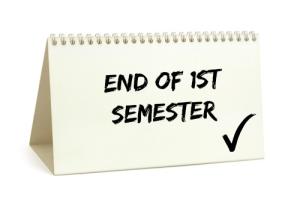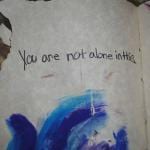As I write this essay on Friday afternoon, it is the last day of regular classes for the Fall semester. Several days of final exams begin Monday, but it’s essentially all over but the shouting. Not that anyone’s shouting—everyone’s too exhausted for that. We are finishing the fourth consecutive semester of higher education during Covid-19, and everyone I know—both students and faculty—is showing the strain. Yet we have a lot to be grateful for on my campus. All classes were taught in person this semester (although everyone was required to wear masks), and the feared spike in Covid-19 cases sufficient to send everyone remote never happened.
The end of the semester is a typical time for faculty to compare notes about interesting and humorously incorrect things that students said in class or wrote on exams and/or papers over the past few months. This time around, though, none of those faux pas stand out to me. What I will remember about this semester instead is that, despite the challenges we all faced, the students in all three of my classes raised their game to a level even higher than the usual high bar I set in my courses. Class participation, online discussion forum conversations, regular short written reflections, and major papers regularly reflected a focus, purpose, and energy that—for lack of a better explanation—I attribute to a heightened appreciation of the importance of the life of learning, as well as a stubbornness resistance to letting this fucking pandemic rob us of the privilege of being immersed in the life of learning.
As I am able to retool and reenergize over winter break, I hope to share some of the student wisdom that I’ve heard and read this past semester. One example is from a short reflection that a student in one of my two sections of General Ethics wrote back in early November. All fifty of the students in these sections, regardless of major, were taking the class because an ethics course is a requirement in the extensive core curriculum required of all Providence College students, regardless of major. Interdisciplinarity and immersion in the humanities is a hallmark of our college’s mission. Gail (her name has been changed for obvious reasons) is a senior History major (one of perhaps only five of twenty-five students majoring in the humanities). She intends to do graduate work in history, applying mostly to graduate programs in the UK.
An ongoing assignment in all of my courses is to write, over the course of the semester, ten “short reflections” of 500-600 words each on an upcoming reading assignment. I describe the assignment as follows:
These reflection papers are not intended to be book reports on the upcoming reading, nor are they to be mere descriptions of the text. Instead, each reflection should focus on some aspect of the reading that you find thought-provoking, confusing, annoying, controversial, or fascinating—anything that made you think.
One of the assigned readings during our unit titled “Does Ethics have anything to do with God” was Michael Ruse’s “Why God is a Moral Issue.” Ruse is an atheist, but begins this essay by criticizing “New Atheists” like Richard Dawkins and Daniel Dennett who, in their expression of their aggressive atheism, “are self-confident to a degree that seems designed to irritate . . . they have a moral passion unknown outside the Old Testament.” By the end of his essay, though, Ruse is equally critical of believers on the other side of the spectrum, writing that “it seems morally repugnant to accept—if not rejoice in—living in a world ruled by the God of religions.”
What follows are excerpts from Gail’s reflection on Ruse’s essay, edited only for length and to remove identifying details.
I have personally been a victim of New Atheists. As a Christian young woman, I often experience Providence College to be a safe haven. Although comfortability can be more of a hindrance than an opportunity, Providence College offers not only a support to the belief in God but, more importantly, a diversity in thought due to courses required in an array of disciplines. As for my friends in England, they fit Ruse’s image of atheists perfectly. My university-age British friends are all atheists. Furthermore, their secular education offers no interdisciplinary diversity. While I am a history major, I also have studied in the business school the sciences, other humanities like Theology, the language department, and many others. My British friends “have an ignorance of anything beyond their fields to an extent remarkable even in modern academia” (Ruse, 168). Their attention is geared towards the Bible or Plato’s Dialogues. And, if one is studying humanities, they may never study Sir Francis Bacon’s scientific method. The interdisciplinary approach, lived out by Blaise Pascal, both mathematician and philosopher, is essential to understanding the complexities of human life.
In her next paragraph, Gail engages with the problem of evil—if this world was created by a good, omnipotent, and all-knowing God why is there so much evil in it—that we had spent several previous classes discussing and that Ruse considers to be one of the primary problems that causes people to be atheists. Gail notes that she also has found her faith challenged by this problem and these unanswered questions, most recently focused by Covid-19 and its devastation.
Gail concludes her reflection as follows:
Our class discussions have widened my scope of understanding of the question. I have concluded that all four components [evil, divine goodness, divine power, and divine knowledge] can continue together – God’s good and evil exist; however, His omnipotent and omniscient must be reduced for God’s omnibenevolence to be strengthened . . .
I humbly admit that I take offense to New Atheist’s founders, like Richard Dawkins’, concern “about bringing a child up Catholic in the first place.” I hope to not only continue my faith but to pass it on to my children. Yet, I am more aware now of the perspective of New Atheists. Strong claims of belief and nonbelief can be dangerous, as we have seen in everyday persecution of one another, and amoral behaviors found in our history books like the Irish Troubles. Moral issues are a tricky, since claiming that God exists is not equivalent to the truth claim that two plus two equals four. Instead, we live in a complex world. Therefore, I learned from Ruse that we must not have “scornful contempt” for those who differ. Instead, we need to be aware of our ignorance and bias while also being open to the arguments of others. Ruse’s work allowed me to realize this. I am more confident in my faith and its future in my life. Though, on the other hand, I have seen a glimpse into the thought process of an atheist in the modern world. Thus, both sides must avoid absolutism to allow humans to flourish and thrive.
There is much to think and talk about here—I have had these conversations with my students all semester. Looking back, I am once again thankful for students like Gail and for the privilege of spending yet another semester engaged in the greatest adventure imaginable with young people—the life of learning.












